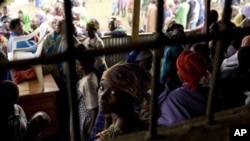NAIROBI -- Human Rights Watch says Rwandan military officials have been arming anti-government rebels in the neighboring Democratic Republic of Congo.
The U.S.-based group also accuses Rwandan military officials of meeting personally with renegade General Bosco Ntaganda and providing him with up to 300 soldiers and weapons.
According to field research conducted by the organization, new recruits brought weapons and ammunition -- including machine guns and anti-aircraft guns -- with them across the border into the DRC.
“Many of the [soldiers] have been recruited in two districts in Rwanda, particularly Musanze and Rubavu," says HRW's senior Africa researcher, Anneke Van Woudenberg. "Some of these were civilians who were forcibly recruited, and some included children who were under the age of 18.”
The research cites witness accounts of military officials meeting with Ntaganda last month in the Rwandan town of Kinigi, near the Congolese border. Ntaganda is wanted by the International Criminal Court for recruiting children as a deputy in an armed political group that fought in northern Congo during the country's civil war.
In March, the ICC convicted Ntaganda's associate Thomas Lubanga on similar charges.
Although Ntaganda and his troops were integrated into the Congolese army as part of a 2009 peace deal, indications that DRC officials were preparing his arrest prompted Ntaganda and several hundred soldiers to mutiny.
Allowing Ntaganda into Rwanda, says Van Woudenberg, is a violation of international sanctions.
“This support in permitting Ntaganda to enter Rwanda without fear of arrest is in violation of U.N. arms embargoes," she says. "It's in violation of the sanctions list, and of course it shows there is still ongoing support for an individual wanted on an arrest warrant from the International Criminal Court.”
Rwanda has denied all charges that it has supported the mutiny. In a message on Twitter Monday, Rwandan Foreign Minister Louise Mushikiwabo called the Human Rights Watch report an “act of reckless media showmanship" that will “only prolong the conflict.”
A statement from Mushikiwabo posted to the foreign ministry's website last week accused Human Rights Watch of profiting from instability in the DRC.
The eastern DRC has been plagued by continuing armed conflict and violence since the end of a civil war in 2003. The area is home to many militia groups, including the Rwandan FDLR rebels, and efforts to integrate the groups into Congo’s army have largely failed.
The U.S.-based group also accuses Rwandan military officials of meeting personally with renegade General Bosco Ntaganda and providing him with up to 300 soldiers and weapons.
According to field research conducted by the organization, new recruits brought weapons and ammunition -- including machine guns and anti-aircraft guns -- with them across the border into the DRC.
“Many of the [soldiers] have been recruited in two districts in Rwanda, particularly Musanze and Rubavu," says HRW's senior Africa researcher, Anneke Van Woudenberg. "Some of these were civilians who were forcibly recruited, and some included children who were under the age of 18.”
The research cites witness accounts of military officials meeting with Ntaganda last month in the Rwandan town of Kinigi, near the Congolese border. Ntaganda is wanted by the International Criminal Court for recruiting children as a deputy in an armed political group that fought in northern Congo during the country's civil war.
In March, the ICC convicted Ntaganda's associate Thomas Lubanga on similar charges.
Although Ntaganda and his troops were integrated into the Congolese army as part of a 2009 peace deal, indications that DRC officials were preparing his arrest prompted Ntaganda and several hundred soldiers to mutiny.
Allowing Ntaganda into Rwanda, says Van Woudenberg, is a violation of international sanctions.
“This support in permitting Ntaganda to enter Rwanda without fear of arrest is in violation of U.N. arms embargoes," she says. "It's in violation of the sanctions list, and of course it shows there is still ongoing support for an individual wanted on an arrest warrant from the International Criminal Court.”
Rwanda has denied all charges that it has supported the mutiny. In a message on Twitter Monday, Rwandan Foreign Minister Louise Mushikiwabo called the Human Rights Watch report an “act of reckless media showmanship" that will “only prolong the conflict.”
A statement from Mushikiwabo posted to the foreign ministry's website last week accused Human Rights Watch of profiting from instability in the DRC.
The eastern DRC has been plagued by continuing armed conflict and violence since the end of a civil war in 2003. The area is home to many militia groups, including the Rwandan FDLR rebels, and efforts to integrate the groups into Congo’s army have largely failed.




